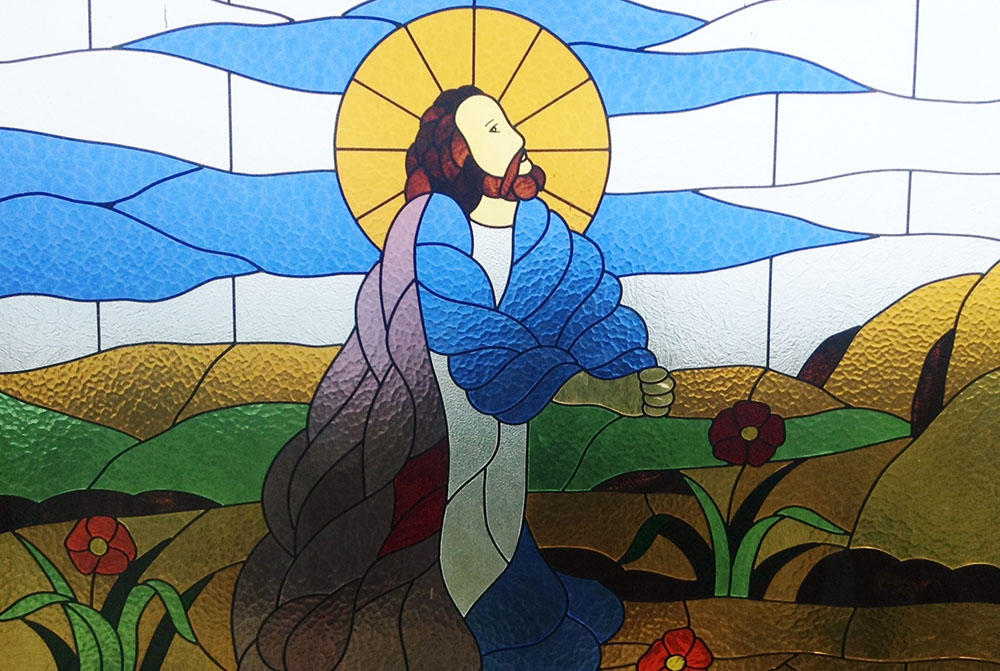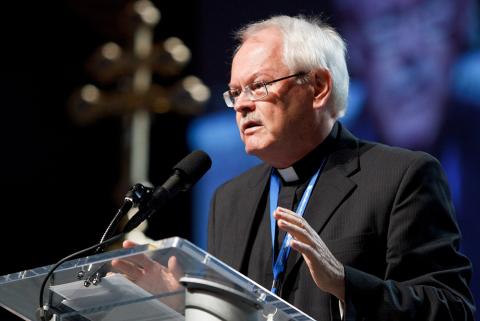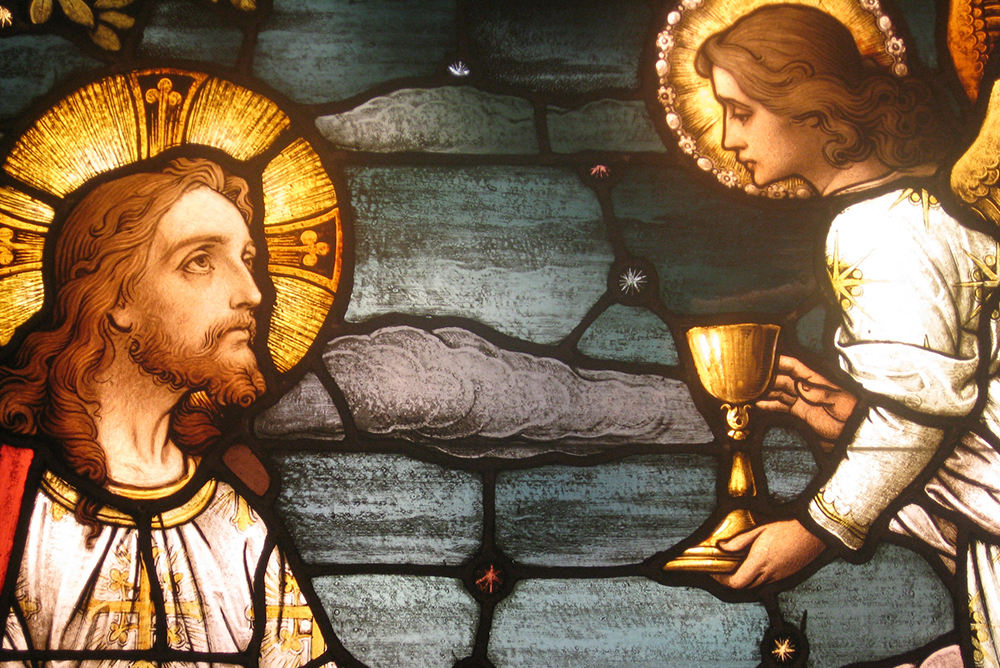
Jesus is depicted praying in a stained glass window in Bukit Doa Getsemane, Ambarita, Samosir, Indonesia (Wikimedia/Christian Advs Sltg)
In my last column, I wrote about the importance of self-care and the need to embrace forms of political, intellectual and spiritual resistance in the months and years ahead. Just days after Donald J. Trump was sworn in as the 47th president of the United States, I find myself continuing to reflect on the themes of self-care and resistance, especially what I called "spiritual resistance."
Earlier this week, Fr. Bryan Massingale, the James and Nancy Buckman Chair in applied ethics at Fordham University, wrote an essay in America magazine titled, "The soul of America — from Martin Luther King to Trump," in which he examined the "signs of the times" through the lens of King's call for collective societal revolution that entailed a transformation of our American "soul." Massingale rightly affirms King's vision for our nation and adds to it the need for a "fundamental change of hearts and attitudes" within the U.S. Catholic Church, drawing on the wisdom of Popes John Paul II, Benedict XVI and Francis.
While that collective transformational work in terms of both church and state is essential, King, Massingale and others also remind us that such progress requires individual conversion and "soul care" as a condition of the possibility for broader social change. And so, as I continue to look for resources to inform and support this necessary soul care, I found myself returning to an inspiring and challenging resource in Christian spirituality: Oblate of Mary Immaculate Fr. Ronald Rolheiser's 2014 book, Sacred Fire: A Vision for A Deeper Humanity and Christian Maturity.
Advertisement
The sequel to his contemporary spiritual classic The Holy Longing: The Search for a Christian Spirituality, Sacred Fire is Rolheiser's presentation of what he calls "mature discipleship," which represents the second of a three-phased experience of lifelong Christian practice.
First, one responds to the initial invitation from Christ to embrace "essential discipleship," which is characterized as "the struggle to get our lives together." Next, one embraces "mature discipleship," which Rolheiser describes as "the struggle to give our lives away." Finally, the lifelong quest to follow Christ sincerely moving from what is basic and essential to what is more challenging and mature, we are called to live "radical discipleship," which is "the struggle to give our deaths away."
As I continue to reflect on the challenges of this moment, it is this middle stage of "mature" Christian discipleship that I find both inspiring and demanding. For Rolheiser, the whole of Christian identity is wrapped up in modeling our lives after that of Jesus Christ. On the one hand, this seems like an obvious claim and something everyone knows, even intuitively. Yet on the other hand, very few of us self-identified Christians put into practice what it is we say we believe and who it is we say we are.
Rolheiser's challenge to Christians to deepen their spiritual lives and Christian commitments in practice resonates with insights of early 20th century German Lutheran theologian and activist Dietrich Bonhoeffer, who wrote about the "costly grace" of genuine discipleship as opposed to the "cheap grace" of superficial Christianity.

Oblate Fr. Ronald Rolheiser delivers the keynote address during the opening of the National Catholic Educational Association's annual convention in Boston April 11, 2012. (CNS/The Pilot/Gregory L. Tracy)
In his 1937 book, The Cost of Discipleship, Bonhoeffer famously wrote:
Costly grace is the gospel which must be sought again and again, the gift which must be asked for, the door at which a man must knock. Such grace is costly because it calls us to follow, and it is grace because it calls us to follow Jesus Christ. It is costly because it costs a man his life, and it is grace because it gives a man the only true life. It is costly because it condemns sin, and grace because it justifies the sinner.
Bonhoeffer understood the true cost of Christian discipleship, having been deemed an enemy of the Third Reich during World War II and executed in the Flossenbürg Concentration Camp in 1945. If we consider Bonhoeffer's witness as an exemplary illustration of the mature discipleship Rolheiser describes, we may wonder how to prepare ourselves to be better followers of Christ, especially in the face of adversity and sometimes even violence.
Speaking about the general vicissitudes of life, far short of Bonhoeffer's total witness, Rolheiser writes:
Our adult years are a marathon, not a spring, and so it is difficult to sustain graciousness, generosity, and patience through the tiredness, trials, and temptations that beset us through those years. All on our own, relying on willpower alone, we too often fatigue, get worn down, and compromise both our maturity and our discipleship. We need help from beyond, from somewhere even beyond the human supports that help bolster us. We need God's help, strength from something beyond what is human. We need prayer.
Prayer is the answer, it is the anchoring and sustaining source of mature Christian discipleship. Like Jesus, whose "real depth and power are drawn from his prayer," as Rolheiser notes, we need to attend to our connection to the divine. The source of our strength, the ground of our being, and the inspiration for our actions as Christians living in a broken and troubled world ought to be God. And the way we connect with God is by praying.

Jesus is depicted in the Garden of Gethsemane in this stained-glass image from the Cathedral of Our Lady of the Angels in Los Angeles. (CNS/The Tidings/Mike Nelson)
Reflecting on how Jesus' first disciples witnessed the importance of prayer, Rolheiser explains:
What they wanted was Jesus's depth and graciousness of soul. And they recognized that this power did not come from within himself, but from a source outside of him. They saw that he connected to a deep source through prayer, through constantly lifting to God what was on his mind and in his heart. They saw it, and they wanted that depth of connection too, for themselves.
This sense of depth and graciousness of soul that Jesus exhibited through his life and ministry, rooted in his consistent prayer to God, is what we ought to strive for in our own lives. What the world needs today, including at the most local level of our own individual interactions, is that graciousness, forgiveness, love, uplifting support and care for others that Jesus models and calls us to emulate.
A fruit of our prayer — our attending to the presence of God in our lives as our grounding and energizing strength — is the ability to bless others. Rolheiser explains that as people of prayer, we are better able to reflect Christ in the world and face the difficulties and challenges, not without fear sometimes or understandable concern, but with a spirit of love nourished by the source of our life.
He adds, "The mark of a deeply mature man or woman, the mark of every mature disciple of Jesus, and the mark of someone truly giving his or her life away is this: he or she is a person who blesses others and blesses the world, just as God does and just as Jesus did."
What we need today are mature disciples who anchor themselves in the practice of prayer. This is a form of spiritual self-care, but more importantly it is the condition of the possibility of being agents of the good news in our time.
We do not know what lies ahead, but we can ground ourselves in prayer and be nourished by the gift of God's grace in order to bless those around us, especially those in the most precarious social locations. In the coming weeks, I intend to continue exploring resources for spiritual resistance, including practices of prayer that will contribute to our growth in mature discipleship and be witnesses of the gospel in the world.







